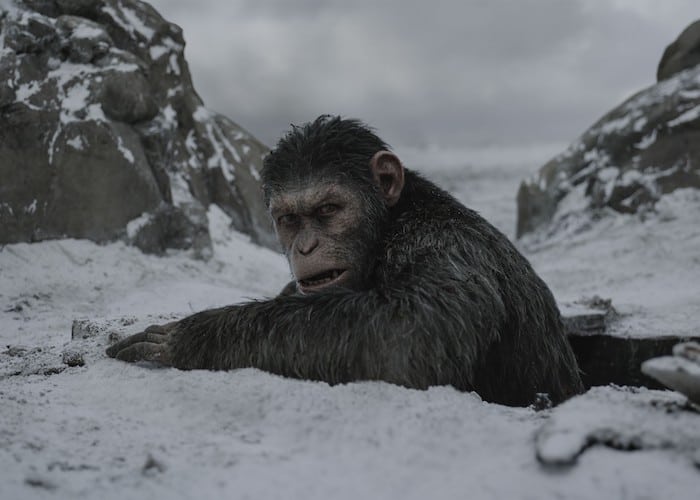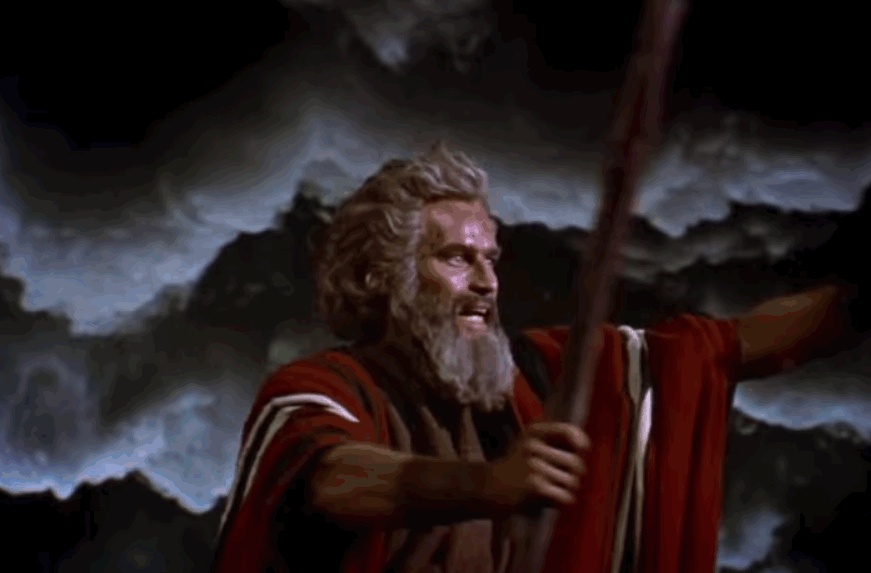
As we learned about his filmmaking, Matt Reeves is a cinephile writer/director who likes to watch old movies when getting started on his own. You better believe he did so in preparation for War for the Planet of the Apes, and of course he’s been sharing those influences with outlets such as Fandango. I highlight four of those plus four of my own picks for works to look back on in this week’s Movies to Watch list.
Among those stated influences are titles I’ve featured on other lists recently or often. War apes Kirk Douglas’s walk through the trench from Paths of Glory, for instance, and I just recommended that with Wonder Woman. There’s also The Empire Strikes Back, which numerous movies strive to be like, most recently Guardians of the Galaxy Vol. 2. Apocalypse Now went with Rogue One: A Star Wars Story and sort of Kong: Skull Island. We can all discuss and recommend others in the comments. Start with these eight, and note that this list deals in spoilers for War for the Planet of the Apes.
Moscow Strikes Back (1942)
Reeves says Empire was something he and co-writer Mark Bomback watched because they “wanted to push the story out into the realm of the mythic.” See the Fandango post for more of his comments on that. I don’t see it so much. Nor do I see War‘s tone as being like that second Star Wars movie, as some critics do. For me, when I heard Empire was an influence, I thought of the climactic battle in the snow, and any battle in snow evokes the Battle of Hoth.
Well, Hoth is influenced by a number of things, including other ice planets in sci-fi and war movies depicting similar wintry fights. Moscow Strikes Back is an Oscar-winning Soviet documentary with footage of snow-set conflict and soldiers on skis, and some of it does now look like not just Hoth but the battle in War. And like the Germans trying to attack the Soviets during World War II in the Battle of Moscow, the army’s attack on the base in War backfires.
The Ten Commandments (1956)
 “I really felt like this movie had to have a Biblical aspect to it,” Reeves tells Entertainment Weekly when revealing this among the influences on War. He also names Ben-Hur —the 1959 version, not last year’s. And he clearly means the 1956 Ten Commandments, of the story’s many incarnations. Neither was given direct homage a la the Paths of Glory bit; rather they merely “informed the vibe we felt about this thing.”
“I really felt like this movie had to have a Biblical aspect to it,” Reeves tells Entertainment Weekly when revealing this among the influences on War. He also names Ben-Hur —the 1959 version, not last year’s. And he clearly means the 1956 Ten Commandments, of the story’s many incarnations. Neither was given direct homage a la the Paths of Glory bit; rather they merely “informed the vibe we felt about this thing.”
However, way back in 2014, Reeves had acknowledged more of a connection to this Biblical epic. “The notion of what we’re after in the third is continue that trajectory to how he becomes the seminal figure in ape history and almost becomes sort of like an ape Moses of sorts, a kind of mythic ascension,” he told a group of junket journalists. I do wish that like these movies War had been allowed an overture. Michael Giacchino’s score would have been perfect for one.
The Bridge on the River Kwai (1957)
In addition to Biblical epics, Reeves and Bomback watched David Lean’s epics, including Lawrence of Arabia, Doctor Zhivago, and this one in particular. Reeves tells Fandango that Bridge “really affected” them, comparing the relationship between its Colonel Saito (Sessue Hayakawa) and Colonel Nicholson (Alec Guinness) respectively to War‘s The Colonel (Woody Harrelson) and the ape leader Caesar (Andy Serkis).
Like the Colonel in War, Saito runs a prison camp and makes his detainees perform manual labor. In War, they’re building a wall (which Reeves has discussed was obviously written in before its current real-world political relevance), while in Bridge it’s, of course, a bridge. In both movies, the imprisoned officer protests the labor and is severely punished. Lean’s movie goes in a more interesting direction from there, though, and definitely has the better ending.
The Great Escape (1963)
No, unfortunately, there is no scene where Caesar jumps a fence on a motorcycle. But this is another movie that influenced the prison camp stuff in War, along with Bridge on the River Kwai. That movie involves Allied prisoners in the Pacific conflict, this one involves Allied prisoners in Europe. The main connection between War and The Great Escape is probably the way the prisoners in both escape via tunnels under the camp.
“There’s some kind of excitement to seeing how a band of apes who come together as a family in a way that, you know, you so root for those soldiers in The Great Escape,” Reeves tells Fandango, also citing Robert Bresson’s A Man Escapes as another movie they watched. Just as in Escape, the tunnels don’t completely lead to safety in War. In both movies, many characters are still sadly killed later. If you think Escape‘s title sounds like it’ll have a happy ending, sorry.
The Outlaw Josey Wales (1976)
Another genre that informed War is the Western, and Reeves admits to the specific Clint Eastwood movies The Outlaw Josey Wales and Unforgiven, which many consider an unofficial sequel to the former. Josey Wales is obviously the more appropriate to start with of the two, but it’s also the one that, like War, begins with the main character’s wife and child being killed, propelling the hero/antihero on his quest for vengeance against their murderer.
Josey Wales is also in part a war movie, starting off during the tail end of the American Civil War, though most of story is set just afterward, as the title character is pursued by a posse led by his adversary. Caesar doesn’t speak much, a la any Eastwood Western role, but War features a new overly talkative comic relief ape (played by Steve Zahn), who reminded me in a part of Wales’s Cherokee companion, Lone Watie (Chief Dan George).
Gandhi (1982)
Richard Attenborough, one of the stars of The Great Escape, won two Oscars for directing and producing this epic biopic about Mahatma Gandhi (played by Ben Kingsley, who won the Best Actor Oscar). There’s a clear comparison between the iconic leader of India’s independence from British rule and Caesar, who leads the resistance against the humans. One difference, though, is Gandhi starved himself in protest, Caesar was starved as punishment.
Gandhi is not one of the movies mentioned by Reeves in interviews, but it does have an acknowledged connection to War. Serkis told the Bombay Times that the movie’s subject inspired his performance as Caesar in the new movie. “He was a strong example of the empathic nature of a leader and the ability to not necessarily lead by force, but to lead by listening and empowering troops,” the actor says of Gandhi.
Project X (1987)
When Bad Ape (Zahn) is introduced, he shows off a plush alligator he possesses as evidence that he’s from the Portland Zoo. Anyone who has seen Project X ought to be reminded of its main chimp, Virgil, who also carries around a plush alligator, his featuring his name on the bottom. I don’t know if it was an intentional reference, but it sure seems like it was. Bad Ape could have had any other animal toy from a zoo, but an alligator is pretty specific.
I’m repeating myself with this recommendation, as it was also on my list of movies to see after the previous installment, Dawn of the Planet of the Apes. But that was a list of ape movies. This time Project X has a more specific connection. Aside from the possible direct tribute in War, though, the most fitting of the reboot trilogy to link to this is Rise of the Planet of the Apes since that’s the one that similarly involves chimps as harmful experimental test subjects.
Unlocking the Cage (2016)
Speaking of chimps kept in captivity against their will and exploited, Serkis has become an outspoken advocate for apes, recognizing newly enacted laws in interviews and doing PSAs for Peta. He’s surely aware of this film by documentary legends D.A. Penneabaker and Chris Hegedus, which follows lawyer Steven Wise and his efforts for nonhuman rights, particularly for chimpanzees. During the film, he seeks to grant legal personhood to some specific animals.
It sounds like an issue film, but it’s not. Don’t expect Blackfish with chimps. If you know the work of the filmmakers, who come from a very observational “verite” tradition, you shouldn’t expect that anyway. Unlocking the Cage is a character-driven courtroom doc that just happens to be about a man fighting for a cause. The issue of nonhuman rights carries through that, but so does it carry through the themes of the Planet of the Apes movies, too.
Honorable Mentions (primarily via Reeves’s curation for Fandango Now): Bedtime for Bonzo, Ben-Hur, Doctor Zhivago, The Empire Strikes Back, The Good the Bad and the Ugly, Lawrence of Arabia, A Man Escapes, Paths of Glory, Ran, Unforgiven.
Related Topics: Movie DNA, Planet of the Apes
